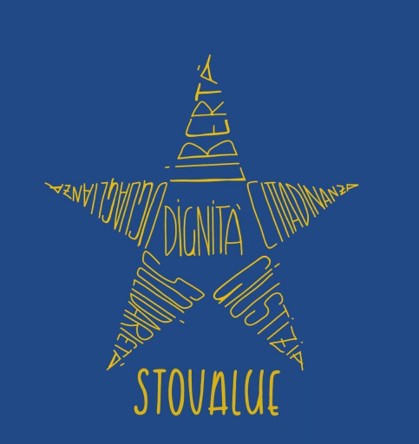EQUITÀ SOCIALE E BENESSERE
La sostenibilità sociale è la capacità di garantire che le condizioni di benessere umano siano equamente distribuite. In linea con i 17 obiettivi SDGs, i ricercatori eCampus interpretano la equità sociale come quella condizione in grado di mantenere la coesione di una società e la sua capacità di sostenere i suoi membri nel collaborare insieme per raggiungere obiettivi comuni, parallelamente al soddisfacimento dei bisogni individuali di salute e benessere. Cosciente dell’importanza di combattere contro le iniquità e i conflitti causati dai privilegi e da differenze tra sessi, età, gruppi, razze e paesi, eCampus sostiene la ricerca in tema di sostenibilità sociale.

EU values
The “European values” Network includes eCampus University and 5 high schools from Italy (2), Cyprus (1), Denmark (1), and Greece (1). It also includes as a sub-contractor CesUE, which provided the national experts to the Italian pilot project on European civic education and manages EURACTIV Italy. The project aims at introducing systematically EU topics in the Partner schools teaching and activities. To this end the project includes various kind of activities within a clear strategy and specific milestones and deliverables. In the first year there will be initial teachers training sessions on EU issues and workshops specifically devoted to the construction of a vertical curriculum of European Civic Education, the syllabus and teaching material with the help of eCampus and CesUE experts. These deliverables will be tested in the second year in the partner schools. They will be upgraded on the basis of the the feedbacks by teachers and students, in order to be implemented again in the third year, and then become structural feaures of the schools' programs. Every year each school will identify a specific issue related to European values on which its students want to focus. On that topic there will be workshops with students with the help of eCampus. There will also be a public event involving European policy-makers to create a direct interaction between students and institutions and show that the EU is not far away. The latter will be organised in cooperation with CesUE, which will also run workshop with students on “communicating Europe”. From the second year, schools will also launch an internal contest on the EU to select students to participate in a “European Values” summer schools, with students and teachers from all partners. Within the summer school there will be also one session involving European policy-makers to interact with students, organised in cooperation with CesUE. Through CesUE the EURACTIV Network will be involved as a media partner.

Synchronous and asynchronous tele-exercise to encourage the participation in sport and physical activity and to promote them as a tool for health
The COVID-19 crisis shed light on the importance of digital education for European digital
transformation and on home-based exercise during quarantine and restrictions. New Eurobarometer on
sport
and physical activity reported that the proportion of Europeans who never exercised or played a
sport
has increased, in particular Italy, Portugal, Croatia and Latvia. The project involves an
appropriate
mix of participating organizations (traditional and telematic universities, ONG, sport confederation
and
club) for tele-exercise, involving newcomers and less experienced organizations.
The objectives of the project TELEexe4ALL are:
1) to develop a new open-source platform that delivers supervised and interactive (synchronous
or
asynchronous) group exercise sessions encouraging participation in sport and physical
activity;
2) to create an online educational course of tele-exercise to encourage education in
sport.
The platform “TELEexe4ALL” will be used: to organize 1024 sessions of synchronous tele-exercise for
general and special populations (200 persons) and athletes with and without disabilities (100
athletes);
to broadcast 150 hours of asynchronous tele-exercise for target groups and athletes; to organize 4
online competitions for 200 athletes with and without disabilities; to address horizontal priorities
by
tele-exercise creating short video message to promote social inclusion, environmental and
climate-change. Moreover, in the platform the use of AI/ML techniques will allow to evaluate,
through a
specific algorithm, the reduction of carbon emissions through the identification of the best
initiatives, the monitoring of results and the optimization of processes in view of energy
efficiency
and emission reduction.

Multiscale
MultiScale EU addresses the overall need for an effective, motivating and pedagogically transferable EU training aimed at teachers, schools and VET providers of all ISCED 1-4 levels. A skilled and diverse team of academics, technicians, trained teachers and supporting partners carefully designed the working plan and allocated resources to implement a comprehensive project strategy to trigger medium and long-term systemic change: targeted interventions and a consistent communication and dissemination strategy will both achieve localised results and engender positive feedback loops on other beneficiaries. Parallel WPs ensure: * an intensive experimentation of EU-exploitable solutions in the Italian laboratory: tailor-made learning resources and training opportunities differentiated by all school levels, disciplinary learning objectives, general/vocational paths; higher education EU module and textbook for under-graduate, graduate, vocational courses eligible for teaching careers; research and policy advocacy promoting a “multiscale” vision for teachers’ training in cross-curricular civic education. * a direct and relentlessly fostered cross-national dimension: deliverables and learning resources available in 8 languages, targeted local training events in 6 EU countries, 3 Trans-national Summer Schools covering all participation costs for 20 EU teachers/year, a helpdesk to help less experienced teachers accessing EU opportunities, a Joint Advanced Training Program enhancing European inter-university partnerships; * local adaptations and counselling to school, with a specific focus on EU Green skills and EU citizenship education vertical curriculum learning objectives; Massive Open Online Students’ Assemblies and bottom-up EU inspiration for teachers; * the EU supranational projection: an international publication, a Policy Brief Launch in Brussels and two trans-national Academic Seminars aimed at contributing to the development and debate on the European Education Area

European citizenship education
EUact took stock of three EU educational best practices awarded public promotion by the Commission and crossbred them with distance learning technologies in a working program whose activities succeeded in involving Italian secondary students and teachers, Cinema Theatres and cultural associations from 50% regional territories of the country, beside enhancing the EU studies orientation of university students and academic staff from different Faculties at eCampus (Law, Humanities, Psychology, Economy and even some scholars from the Faculty of Engineering). The working program particularly benefited from the advanced virtual learning environment provided by eCampus and from its decentralized network of seats in strategic Italian cities, where local branches of the University were involved in the realization of events putting together both their internal different services (didactic tutoring, marketing and communication, administration) and their locally rooted partnerships (newspapers and online media, schools, public authorities, families and civil society). The Juncker Commission 10 priorities fertilized all EUact activities, allying didactic methodological concerns with a consistent information campaign that enhanced EU knowledge and stimulated civic participation of direct and indirect beneficiaries. The main series of decentralized events have been the Cinema European Awareness Days featuring the filmed version of "Europe: what a Passion! The tale of a stormy love affair" - a thrilling music recital show on EU history - followed by an innovative and much appreciated Q&A session abolishing the distance between experts and participants by way of an interactive online survey that participants could access directly from their smartphones and that greatly helped to stir participative debates. Cinema events also helped launching all other EUAct main activities: classrooms follow-ups managed by contact teachers (and, in some cases, by EUAct staff upon request of teachers and beyond the working programme), a national on-line contest for students and a series of teachers training workshops. Teachers training consisted, as planned, of three synchronous decentralized workshops whose pedagogical design drew on a 2015-2017 national pilot initiative for EU training promoted by EU and Italian authorities. This initiative was the first one promoted by eCampus on the official platform of the Ministero dell'Istruzione for teachers' training initiatives (SOFIA). The contest required participants to delve into EUact policy focus and awarded participants could take part for free to the first intensive summer program offered at eCampus headquarters in Novedrate (CO) on EU topics, where scholars versed in EU studies offered them high-level introductory seminars to different EU-related disciplines. The internal academic seminar, initially devoted to the working program implementation, soon became an effective tool for the development of EU studies inside the University: it prompted the project of a collective interdisciplinary publication on the EU relevance in many scientific fields of study, it stimulated the development of a Research Centre on Multilevel Integration and Governance processes. All EUAct activities succeeded in stimulating follow-up initiatives to exploit and further disseminate

STOVALUE - History of Human Values and Charters of Fundamental Human Rights in the European Union
Starting this academic year, the eCampus University of Studies will activate a Jean Monnet Module on
"History of Human Values and Charters of Charter of Fundamental Rights of the European Union"
(StoValUE), thanks to a European Union co-funding for the three-year period 2022-2025 in the
framework of "Erasmus Plus - Jean Monnet Activities", aimed at supporting excellent teaching and
research activities on topics related to the European integration process.
The module, coordinated by prof. lessandra Mita Ferraro, promotes historical knowledge of the
indivisible and universal human values provided in the Charter of Fundamental Rights of the European
Union, such as dignity, freedom, equality, solidarity, justice and citizenship.
Within the framework of the StoValUE module, will be organized meeting in schools, seminars for PhD
students and initiatives open to the civil society, even on Europe Day (9 May).

EDGE – Enhancing Disabled-people Greatness and their Employability
According to the EU Disability Strategy 2010-2020, about 80 million people living in the EU have a
mild to severe disability. About 47% of them are employed compared to 72% of people without
disabilities. The obstacles they face, such as gaining access to training or employment, leave them
vulnerable to social exclusion. Lower employment and education levels cause that the poverty rate
for those with disabilities is 70% higher than the average (UN Convention of the Rights of Persons
with Disabilities – CRPD). Among them, there are currently around 4 million people in the European
Union who have Intellectual and relational Disabilities (ID). Their unemployment rate is more than
twice as high as for the general population.
EDGE is expected to develop innovative outputs, and engage into intensive dissemination and
exploitation activities of existing newly produced products and innovative ideas, in the field of
job inclusion for young people with intellectual and relational disabilities.
The main priority is to promote social inclusion processes enhancing the access, participation and
learning performance of disadvantaged learners, and so reducing disparities in learning outcomes.
EDGE will create social inclusion for youth with disability throughout innovative integrated
approaches: innovative training (through new methods/tools and contents), job placement activities
(through innovative work-based learning), diversity management (inclusive job design, inclusive job
environment and teams), self-employment (through innovative mentoring).
The key element of EDGE is the creation of VET business partnership at local and regional
dimensions, aimed at promoting work-based learning paths and inclusive work environments. Companies
– HR managers and entrepreneurs – will be actively involved for sharing with VET providers dealing
with disability, innovative work-based experiences enriched with inclusive job design approaches.
Moreover, they will be involved in the experimentation of inclusive job environments and teams,
adopting diversity management policies and strategies.
EDGE has three primary strategies:
1. Supply-side approaches, focused on preparing the target for employment and then facilitating
their placement;
2. Demand-side approaches, focused on creating a desire in employers to hire them;
3. “Third way” approaches, focused on promoting self-employment paths.
EDGE is aimed at improving the well-being and quality of life of young people with mental and
relational disabilities, pursuing the following 3 main objectives:
• Creating innovative and ad hoc training methodologies for a successful job placement;
• Prompting companies to be more proactive about hiring people with mental challenges;
• Fostering entrepreneurial mindset, competences and possibilities.






